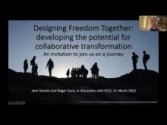Resources
Please search or filter the resources to find those of interest to you. If you are a non-member, you will not be able to see all the videos and presentations from past SCiO Open Meetings.
To find videos of Open Meeting sessions, filter on Resource type "Session" and Attachment "Yes".
Green blob means: "The material is in the public domain, you may reuse with accreditation."
Orange blob means: "The content is company confidential or content confidential, the approach may be open, please contact the author before using."
Red blob means: "Everything is protected, please contact the author before using."
When Unfreeze-Move-Refreeze Isn’t Working: Doing, Thinking and Making Via Systems Changes Learning
Practitioners coming to the systems sciences and/or systems thinking have an interest in “systems change(s)”. Many come from premise that that change occurs as “unfreeze-move-refreeze”, misattributed to Kurt Lewin. A more reflective view of systems changes not only sees distinctions between the intended and emergent recognized by Henry ... Read more

Systems Leadership and Systems Change are very popular phrases at the moment - search the web for a sense (and Medium.com if you really want to boggle your mind). Some of it is really good, some of it is risible, and much has little to do with systems thinking or systems practice.
This session will explore some of the existing territory and dimensions and sketch out Benjamin's approach, drawing on two of his articl... Read more

Abstract: I have yet to find the word ‘cybernetics’ in mainstream writing on government and yet the comparison to steering a ship appears in the writing of Plato 2,500 years ago on government, and the word itself in the writing of Ampere 300 years ago.
Beer’s cybernetic approach to systems thinking upon which he based his VSM gives a foundation from which I explore the purpose and structure of democracy.

Detailed description of apprenticeship
Antoni Oliva Quesada nos habla de cómo usar modelos de simulación para comprender cuáles son los factores que hacen que un problema complejo se comporte como lo hace. Para mí, el propio concepto de que los sistemas son dinámicos ya es profundo y retador en sí mismo, porque sugiere que éstos cambian y evoluciona con el tiempo. Esto implica que hay factores que pueden hacerlos cambiar más rápido o mas lento y que, por extensión, puede que tengamos ... Read more

RRP: £15.99 Hardback: 352 pp Publisher: Allen Lane; ISBN 978-0241447642
Farming is the world's greatest cause of environmental destruction - and the one we are least prepared to talk about. We criticise urban sprawl, but farming sprawls across thirty times as much land. We have ploughed, fenced and grazed great tracts of the planet, felling forests, killing wildlife, and poisoning rivers and oceans to feed ourselves. Yet m... Read more

Nobody really understands their business....but how well does the business understand itself?
In this talk will use a case study to demonstrate how a zombie organisation can transform itself into conscious collective and become the compute function for its own operation.

This presentation charts the journey of Public Health's engagement with systems thinking, initially via Theory U and later through Community Operational Research methods. The practical application, pitfalls, considerations of using these methods in community settings brings this, sometimes conceptual focus, into the "real" world.
The emergence of Adult Development as a seam of research that helps to bring a sense of movement to seemingly i... Read more

RRP: £11.50 Paperback: 100 pp ; ISBN: 978-3756205677 (also available in German)
Who is able to synchronize the work of 100 trillion suborganizations? Who can accelerate every single process by a factor of 100 billion? Which organization has a growth rate of 100% in 20 minutes? Which organization survives and growths since 4 billion years? Life is the ultimate best-of-best-benchmark for organizations. It is time t... Read more

Roger Duck and Jane Searles share their recent experience of creating conditions to enable exploration of transformational systemic change.
The work involved the collaborative development of a visionary whole system transition architecture. The specific context was regional transport, but the systemic methodology is of more general application, and they are keen to discuss with others in the interest of mutual learning.
This work was originally... Read more
















